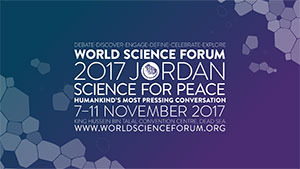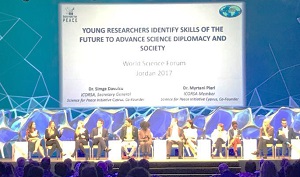


The World Science Forum (WSF), held since 2003, is the largest science policy meeting in the world. It is organized by UNESCO, the Hungarian Academy of Sciences and other partners every two years. This year, the World Science Forum was hosted in Jordan on the theme of ‘Science for Peace’. The breaking news is that for the first time, young researchers were given their own plenary session!
The session, ‘Young Researchers Identify Skills of the Future to Advance Science Diplomacy and Society’, was organized and held jointly by International Consortium of Research Staff Associations (ICoRSA), the Global Young Academy (GYA), the World Academy of Young Scientists (WAYS) and the World Lecture Project (wlp°). The panel of plenary speakers contained seven young researchers from around the world, representing each organization, to talk about the role that young scientists play in science diplomacy and in promoting peace through the establishment of shared communities and research collaborations.
Within this context the speakers described a set of essential skills that researchers must develop to advance science diplomacy initiatives and provide transboundary and transdisciplinary science, technology, engineering and mathematics (STEM) innovations to tackle the 2030 Sustainable Development Goals (SDGs) and to expand career opportunities as the 21st century unfolds. The set of skills that were highlighted can be summarized as:
Marga Gual Soler (WAYS, AAAS, USA) summarized the efforts and the participation of young scientists in the WSF since the beginning of the forum in 2003 and emphasized the importance of having Early Career Academic Investigators (ECAIs) in high level meetings for science diplomacy. A major reason why early career scientists should be present in science diplomacy meetings is that they are able to highlight the very recent challenges that researchers face, hence they can provide valuable contribution to development of new policies in science and research.
.jpg) Other young scientists then presented case studies that showcased community-building projects undertaken to promote peace and bridge divides through scientific collaborations. There are many regions in the world where ties between divided communities can be strengthened through scientific cooperation, and thus science can be used as a vehicle for peace.
Other young scientists then presented case studies that showcased community-building projects undertaken to promote peace and bridge divides through scientific collaborations. There are many regions in the world where ties between divided communities can be strengthened through scientific cooperation, and thus science can be used as a vehicle for peace.
Simge Davulcu (Vice-chair, ICoRSA) and Myrtani Pieri (ICoRSA), both from Cyprus, together presented a prime example on cooperation via science diplomacy between the divided communities of Cyprus: Turkish and Greek Cypriots. They explained their efforts to converge the Turkish Cypriot and Greek Cypriot scientific community under the newly founded ‘Science for Peace Initiative’. This initiative provides a platform for scientific collaboration between the Turkish Cypriot and Greek Cypriot scientists as well as providing science communication and science outreach events for the public, especially the youth. The co-chairs of the Science for Peace Initiative Cyprus emphasized that the practice of science diplomacy between the Turkish and Greek Cypriot scientists can open a dialogue between the two societies and stimulate peace. They also underlined the importance of the skill of “making science simple” by scientists for the community in order to advance the society, and showcased some of the active science communication and outreach projects organized and/or supported by the Science for Peace Initiative Cyprus such as the Mediterranean Science Festival, Café Scientifique, Science of Perfumes, and Science Spa.
Yusuf Baran (GYA, Turkey) and Alexander Sasha Kagansky (GYA, Russia) presented the importance of building partnerships and provided examples of bilateral scientific collaborations between Turkey and Russia which successfully continued even through the difficult poltical times between the two countries. Sasha also highlighted the importance of exploring the interconnectivity between science and art across various disciplines such as biophysics and epigenetics through projects that use science and art to contribute to peace and benefit society.
Ola Elzein (ArabWAYS, Lebanon) wholeheartedly told the real life story of the daily life of a molecular cell biologist in the laboratory including challenges especially in the MENA region and explained the skill of being resilient, and the role that it plays in achieving scientific breakthroughs. She highlighted the importance of not giving up, and learning from our mistakes in order to keep going to advance scientific research.
 Tolullah Oni (GYA Co-chair, South Africa) described the skill of building capacity. She told the audience about the current STEM pipeline and basic education in the Africa region and identified the need for bridges between STEM and policy to exchange knowledge towards benefit of society. She also described the mechanisms that promote career development for early career young researchers.
Tolullah Oni (GYA Co-chair, South Africa) described the skill of building capacity. She told the audience about the current STEM pipeline and basic education in the Africa region and identified the need for bridges between STEM and policy to exchange knowledge towards benefit of society. She also described the mechanisms that promote career development for early career young researchers.
Following, Abier Amarin (CRDF Global, MENA Director, Jordan) underlined the importance of leveraging resources. She described the need to advocate for more funds using policy by the early career researchers.
Michael Fischer (wlp°, WAYS) told his story about creating the World Lecture Project and showcased the skill of creating opportunities. He explained that we should use technology to break down barriers and borders. He also described how ECAIs can get involved with Jobs of Future (JOF) and create their own opportunities.
The session ended with the representative of the winning group from the young scientists side event, Mohamad Nadim Adi, presenting his pitch on ‘Cybersecurity’, and in particular the recommendation to establish an international body to regulate e-currencies such as Bitcoin.
The plenary session, which received great interest from all participants, gained the support and appreciation of many international scientific establishments such as the International Council of Science (ICSU), the American Association for the Advancement of Science (AAAS), the United Nations Educational, Scientific and Cultural Organization (UNESCO) Natural Sciences Department, Public Health Department at Global Risk Disaster Mitigation - UK Public Health Department, the United States National Academy of Sciences and many top-level individuals attending the WSF.
The plenary session was also a great opportunity for the voices of young scientists to be heard.
Let’s hope that it becomes a tradition in the World Science Forum!
Credit: Simge Davulcu, Vice-chair ICoRSA, Cyprus